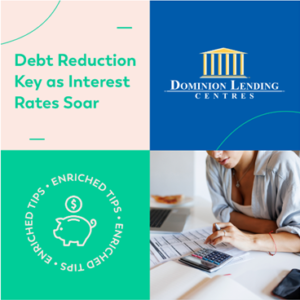 It’s Time to Crush Your Credit Card Blues.
It’s Time to Crush Your Credit Card Blues.
Although credit cards interest rates have not been affected by the recent surge in the prime lending rate, the fact remains that credit card debt is usually the most expensive debt you can have. The average is around 20% and even the so-called ‘low interest’ cards carry a rate in excess of 10%. Expediting the demise of your credit card balance should be the number one focus for anyone looking to improve their financial situation. Here are five actions to get you started.
- If you are carrying a balance, the first step is to put the card(s) away. Whether you put them in the food processor or just temporarily turn them off (our recommendation), you need to own up to your mistake and not add any more fuel to the fire. If it’s the case where you have no choice but to use the card (a prepayment for example) make sure to make a payment to cover that charge right away.
- Take a minute to fully understand the consequences of a credit card balance. Search out the details of your credit card statement until your find the section that tells you exactly how many years it will take to eliminate that balance with minimum payments. While you are at it, make sure to confirm the interest charge for that month and just how little of your payment is actually going toward reducing the balance. It can be a bit shocking, but also quite motivating! The government has a simple online calculator for you to easily analyze different repayment options.
- Plan your repayment attack. Making a few random spending sacrifices and hoping that you will have a little more left at the end of the month to pay towards your card is wishful thinking. You need to figure out ASAP the maximum amount you can throw at your credit card debt every month and chart out when you are going to be debt-free. Set up an automatic transfer from your bank account to your card every payday and make that money invisible – you can’t spend what you can’t see!
- Investigate balance-transfer credit card options… but only if you have a plan and are confident you can pay off the balance within the prescribed period! A balance transfer card shifts your debt to a new card (for little or no fee) which offers a limited time period (usually 6 -12 months) with a very low interest rate (often 0%) to pay off the balance. This cuts your interest expense to zero and ensures that 100% of your payment goes to reducing the balance. However, you have to be very disciplined and have the income to make regular payments. The card company is literally banking on you to fail and hopes you will miss the payment deadline, because that will trigger an avalanche of penalties, fees and interest charges that will put you worse off than ever!
- Pick up the phone and call your card company. It might be more possible and easier than you think to actually negotiate a lower interest rate on your credit card. If you have had a card for a while and have been carrying a balance and making the minimum payments, you are a valued customer! Your card issuer is very interested in keeping your business and may be willing to negotiate. You will have to get through to the right people and know what to say, but 15 or 20 minutes on the phone could save you a chunk of cash – even a few percentage points would help.
The above tips will help you get started on the road to eliminating your credit card balance. There are no shortcuts and it may require a lot of sacrifice depending on how much debt you have, but the mental burden that lifts when you see a big zero under “balance due” it will be worth it!

 Market Beware: Subject Free Offers
Market Beware: Subject Free Offers
 Debt Reduction Key as Interest Rates Soar
Debt Reduction Key as Interest Rates Soar Title fraud is a danger in B.C., and home insurance can’t protect you from it
Title fraud is a danger in B.C., and home insurance can’t protect you from it After You Buy – Closing Tips
After You Buy – Closing Tips Second Mortgages: What You Need to Know
Second Mortgages: What You Need to Know How Job Loss Affects Your Mortgage Application
How Job Loss Affects Your Mortgage Application How to Pay Off Your Mortgage Faster
How to Pay Off Your Mortgage Faster